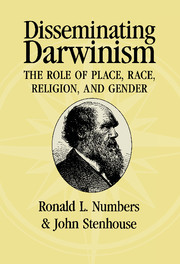Book contents
- Frontmatter
- Contents
- List of contributors
- Acknowledgments
- Introduction
- 1 Science, region, and religion: the reception of Darwinism in Princeton, Belfast, and Edinburgh
- 2 Darwin down under: science, religion, and evolution in Australia
- 3 Darwinism in New Zealand, 1859–1900
- 4 Environment, culture, and the reception of Darwin in Canada, 1859–1909
- 5 Darwinism in the American South
- 6 Darwinism, American Protestant thinkers, and the puzzle of motivation
- 7 Exposing Darwin's “hidden agenda”: Roman Catholic responses to evolution, 1875–1925
- 8 American Jewish responses to Darwin and evolutionary theory, 1860–1890
- 9 Black responses to Darwinism, 1859–1915
- 10 “The irrepressible woman question”: women's responses to evolutionary ideology
- Index
4 - Environment, culture, and the reception of Darwin in Canada, 1859–1909
Published online by Cambridge University Press: 06 July 2010
- Frontmatter
- Contents
- List of contributors
- Acknowledgments
- Introduction
- 1 Science, region, and religion: the reception of Darwinism in Princeton, Belfast, and Edinburgh
- 2 Darwin down under: science, religion, and evolution in Australia
- 3 Darwinism in New Zealand, 1859–1900
- 4 Environment, culture, and the reception of Darwin in Canada, 1859–1909
- 5 Darwinism in the American South
- 6 Darwinism, American Protestant thinkers, and the puzzle of motivation
- 7 Exposing Darwin's “hidden agenda”: Roman Catholic responses to evolution, 1875–1925
- 8 American Jewish responses to Darwin and evolutionary theory, 1860–1890
- 9 Black responses to Darwinism, 1859–1915
- 10 “The irrepressible woman question”: women's responses to evolutionary ideology
- Index
Summary
Historians attempting to assess the responses of naturalists in British North America to Charles Darwin's theory of The Origin of Species by Means of Natural Selection soon encounter two significant problems. First, the country's leading Victorian scientists, Sir John William Dawson (1820–99) and Sir William Edmond Logan (1798–1875), were both geologists. As such, they were positioned to address the theory's weaknesses more than its strengths, in the fossil record that appeared to preserve not a single example of one species evolving into another.
Yet their responses differed considerably, as neither Dawson nor Logan reacted primarily out of scientific considerations. Dawson, the principal of McGill College, Montreal (from 1855), longtime president of the Natural History Society of Montreal, and founding president of the Royal Society of Canada (1883), became known internationally for his unremitting resistance to Darwin. In 1860, if not earlier (and, Darwin suspected, before having read The Origin), he determined to defend the traditional place of natural theology in the cosmology of Design. Dawson's long-awaited scientific biography, Susan Sheets Pyenson's John William Dawson: Faith, Hope, and Science (1996), recently confirmed earlier claims that it was “a calling to natural theology that Dawson heard as a calling to science.” Yet while Pyenson also documented the detrimental effects of this decision upon Dawson's subsequent scientific reputation, historians have yet to evaluate definitively not only the impact, but even the nature and extent, of his sustained critique.
- Type
- Chapter
- Information
- Disseminating DarwinismThe Role of Place, Race, Religion, and Gender, pp. 91 - 122Publisher: Cambridge University PressPrint publication year: 1999
- 3
- Cited by

